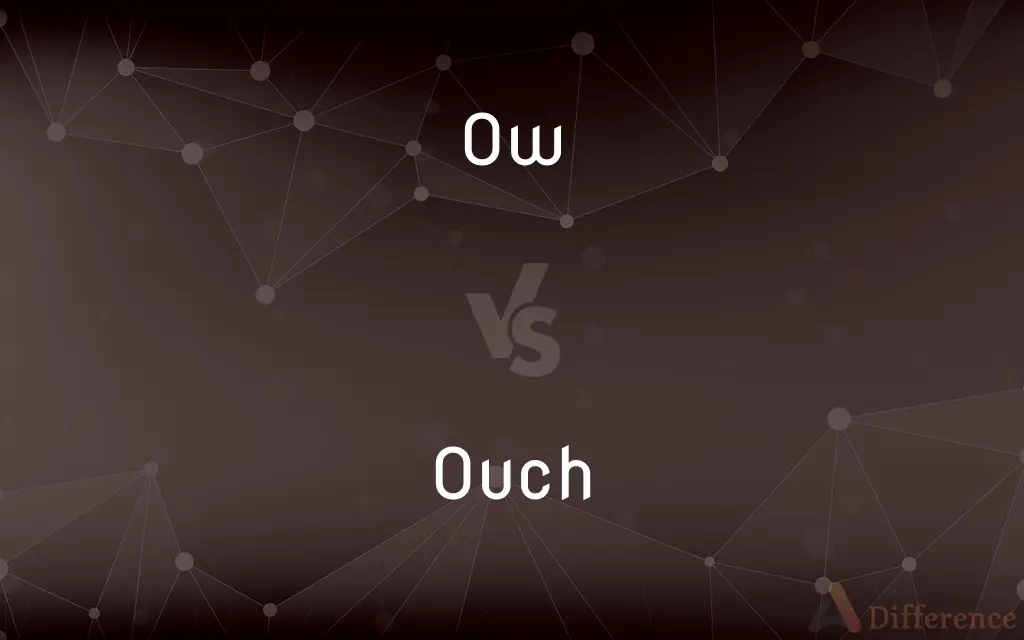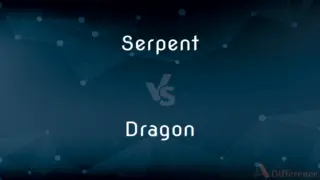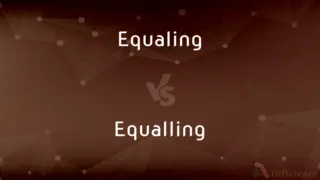Ow vs. Ouch — What's the Difference?
By Tayyaba Rehman — Updated on November 7, 2023
"Ow" is often used for minor, sudden pain, while "Ouch" can imply a higher level of discomfort.

Difference Between Ow and Ouch
Table of Contents
ADVERTISEMENT
Key Differences
"Ow" is a brief exclamation used typically when experiencing a sudden, sharp pain, often mild and short-lived. In contrast, "Ouch" is also an exclamation but is usually associated with a greater intensity of pain or surprise. The distinction lies not in the nature of pain but in the perceived intensity conveyed by the speaker.
When someone hits their toe against furniture, the instinctive, almost reflexive response is "Ow," signifying a quick, sharp pang. On the flip side, "Ouch" might follow a more unpleasant experience, such as getting a vaccination shot, indicating not only the pain but also the displeasure associated with the experience.
"Ow" is informal and commonly used in everyday language, especially in casual or minor instances of discomfort. "Ouch," while also informal, may carry a dramatic flair, emphasizing a more pronounced reaction to pain, often used to express empathy towards someone else’s pain as well.
The use of "Ow" can be almost instantaneous, a part of an involuntary reaction to pain. Whereas "Ouch" is often used when there is a moment to process the pain, perhaps when the pain lingers, making it more pronounced and allowing for a verbal expression that is slightly more prolonged.
In the context of children's language acquisition, "Ow" might be one of the first pain expressions learned due to its simplicity and ease of articulation. "Ouch" might come later, as it often requires a more complex understanding of language to express varying degrees of discomfort and the social interaction of expressing it.
ADVERTISEMENT
Comparison Chart
Intensity
Implies a lower level of pain.
Suggests a higher level of pain or surprise.
Usage
Commonly used for minor, quick instances.
Often used for more intense or sustained pain.
Reaction Time
Used immediately as a reflex.
May be used after a brief moment of processing pain.
Dramatization
Less dramatic, more reflexive.
More dramatic, can be empathetic.
Language Development
Often one of the first pain expressions learned by children.
Learned after understanding more complex nuances of language.
Compare with Definitions
Ow
A reflexive response to sudden discomfort.
Ow, that paper cut stings!
Ouch
An exclamation for acute pain or discomfort.
Ouch, I burnt my hand on the stove!
Ow
An interjection for minor pain.
Ow, I just pinched my finger!
Ouch
An expression denoting empathy for someone's pain.
Ouch, that looks like it hurt a lot.
Ow
A casual exclamation for physical impact.
Ow, the ball just hit my head!
Ouch
A vocal reaction to a painful incident.
Ouch, that bee sting hurts!
Ow
An expression used when encountering a brief pain.
Ow, I stepped on a lego!
Ouch
A word to express both physical pain and emotional hurt.
Ouch, her words were quite harsh.
Ow
A verbal indication of a sharp sensation.
Ow, this hot sauce is burning my tongue!
Ouch
Used to express sudden pain or displeasure.
Ow
Used especially in response to sudden pain.
Ouch
A setting for a precious stone.
Ow
Synonym of ouch
Ouch
A clasp or brooch, especially one set with jewels.
Ow
(music) Used for emotional emphasis.
Ouch
An expression of one's own physical pain.
Ouch
An expression in sympathy at another's pain.
Ouch
A reply to an insult seen as savage (frequently one that is tongue-in-cheek or joking).
Ouch
An expression of disappointment.
Ouch
(slang) Expressing surprise at the high price of something.
Ouch
Alternative form of ouche
Ouch
A socket or bezel holding a precious stone; hence, a jewel or ornament worn on the person.
A precious stone in a rich ouche.
Your brooches, pearls, and ouches.
Ouch
Used to emphasize the discomfort of a situation.
Ouch, getting rejected from that job must have been tough.
Common Curiosities
Is "Ow" a real word?
Yes, it's an interjection used to express pain.
Can "Ouch" be used for emotional pain?
Yes, it's sometimes used metaphorically for emotional hurt.
Do "Ow" and "Ouch" have different origins?
Both are imitative of the sounds of pain, but their etymologies may vary slightly.
Is "Ouch" appropriate for use in children's literature?
Yes, it's commonly used to express pain in a way children understand.
Are these words used in formal writing?
They're primarily used in informal contexts.
Can "Ow" be used sarcastically?
Yes, it can convey mock pain or minimal impact.
Can "Ow" be used in a humorous context?
Yes, often in response to minor mishaps.
Can animals be said to "say" "Ow" or "Ouch"?
Not literally, but these words may be used to anthropomorphize animal reactions.
Do "Ow" and "Ouch" have plural forms?
No, they are invariable as interjections.
Is "Ouch" used differently in American and British English?
Usage is similar, though the context may vary regionally.
Are "Ow" and "Ouch" interchangeable?
They can be, but "Ouch" often implies more intensity.
Is "Ouch" ever used outside the context of pain?
Sometimes it's used to respond to something unfortunate or empathetically.
Can "Ow" be drawn out for emphasis?
It's less common, as "Ow" is typically quick and sharp.
How are "Ow" and "Ouch" used in comics or visual media?
They're often used in speech bubbles or sound effects to represent pain.
Are there synonyms for "Ow" and "Ouch"?
Yes, like "yow," "yikes," or "aye," depending on the context.
Share Your Discovery

Previous Comparison
Serpent vs. Dragon
Next Comparison
Equaling vs. EquallingAuthor Spotlight
Written by
Tayyaba RehmanTayyaba Rehman is a distinguished writer, currently serving as a primary contributor to askdifference.com. As a researcher in semantics and etymology, Tayyaba's passion for the complexity of languages and their distinctions has found a perfect home on the platform. Tayyaba delves into the intricacies of language, distinguishing between commonly confused words and phrases, thereby providing clarity for readers worldwide.
















































